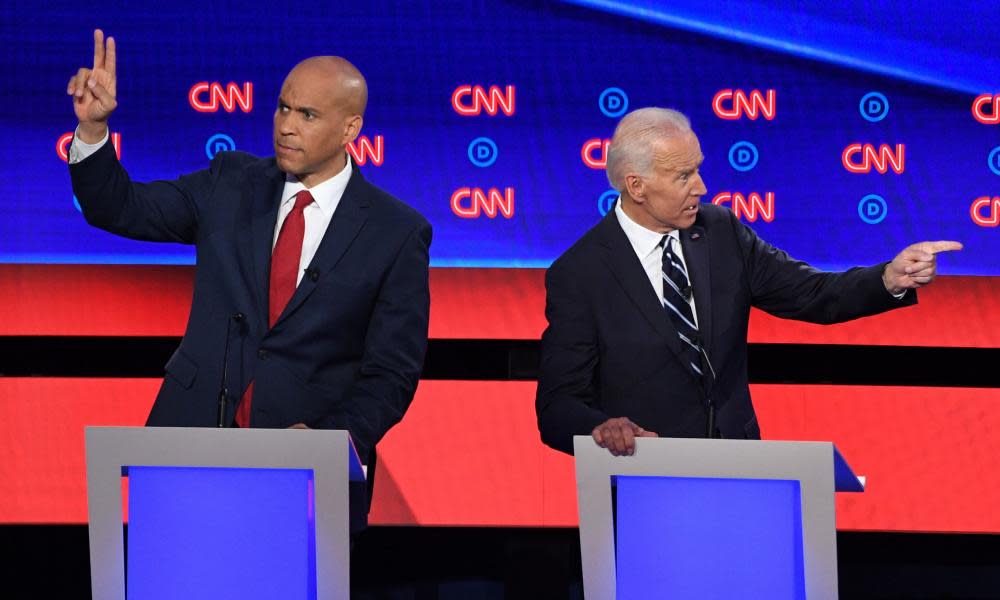The Democratic party must control the debates – or they play into Trump's hands

The second round of Democratic debates is over and, unsurprisingly, we are not much wiser about who will be the Democratic presidential candidate next year or what the Democratic party will stand for. Pundits are, equally predictably, focusing on the “winners and losers” (whatever that means at this early stage of the primaries) and the “Democratic divisions”, whereas some leading Democrats have expressed “alarm” over the negative tone of the debates.
What all of this shows is that the Democratic party should take more control of the televised debates and sooner rather than later. So far, they have been tailored towards the highly dysfunctional US media system, which, as we saw in 2016, plays directly into the hands of Donald Trump. So far, the Democratic debates have been treasure troves for the Trump campaign, who barely have to do their own opposition research, as the Democratic candidates are doing it for them.
Related: Do Democrats win by moving left? Or is moderation the key to victory? | Geoffrey Kabaservice
Moreover, the mass debates visually strengthen the image of a deeply divided and leaderless Democratic party, in sharp contrast to the Republican party, which has fully succumbed to the Great Leader in the White House. Many people might not like Trump himself, or even the Republican party in general, but they appreciate the (illusion of) clear leadership that the two project.
It is certainly commendable that the Democratic National Committee (DNC) does not let current polls determine who can and cannot feature in the debates. So far out, polls are as accurate at predicting who is the most popular candidate as the media pundits are (spoiler alert: neither is very accurate). Let’s not forget that there are still more than 15 months to go before the presidential elections!
It is time to separate the A-listers from the B-listers (not to speak of the D-listers)
That said, it is time to separate the A-listers from the B-listers (not to speak of the D-listers). The zero- to two-percenters have had their moment in the television sun and can now try to cash that in to sell books or get a gig as a pundit on CNN or MSBNC. Others can return to doing what they were elected to do, such as representing their voters in Congress or running a major city. And, most importantly, some should enter a state race they can actually win, so that they help make a difference in the (still unlikely) case of a Democratic president in 2021.
Between 10 and 12 candidates are expected to qualify for the next round of debates, in September, according to the rules set by the DNC. Rather than putting them all on one stage, or random selections on two stages, they should have one debate between the frontrunners and one among the rest. Based exclusively on polls, not the number of unique donors, which is not buying you any more votes in the primaries.
First of all, this finally gives candidates time to outline their views on specific issues in a bit more detail and provides space for a more substantial debate between different candidates. Second, it means that we can listen to the people we care about, uninterrupted by the ones we don’t care about. Candidates without any popular appeal took up a quarter to half of all speaking time in the various debates. Third, it will show a more compact Democratic party, without concealing the fundamental ideological and policy differences that do exist within the party.
However, at least as important is that the DNC wrests control of the format of the debates away from the cable networks that are broadcasting them. The first two rounds of debates have played into Trump’s hands with their stupid gimmicks, like the “raise your hand” questions, Jake Tapper’s childish attempts to get candidates to attack each other and the limited range of issues to be debated (as well as the disproportionate attention on immigration and undocumented immigrants).
It is high time for the DNC to introduce some control on the issues to be debated as well as the format they are debated in. Together with the campaigns of the various candidates, they should ensure that the debates focus on the issues the party and its key representatives consider crucial – which should include largely ignored issues like automation and the future of work, economic inequality, infrastructure and the opioid crisis.
If a specific media organization does not like that structure, you can easily find another one. Or air it yourself online. Journalists and other opinion-makers will watch it anyway, and their spin is more important than the direct impact on the much smaller group of viewers (on whatever media source). If that sounds “undemocratic” to you, think back to 2016, and remember what agenda-setting by the media has gotten us.

